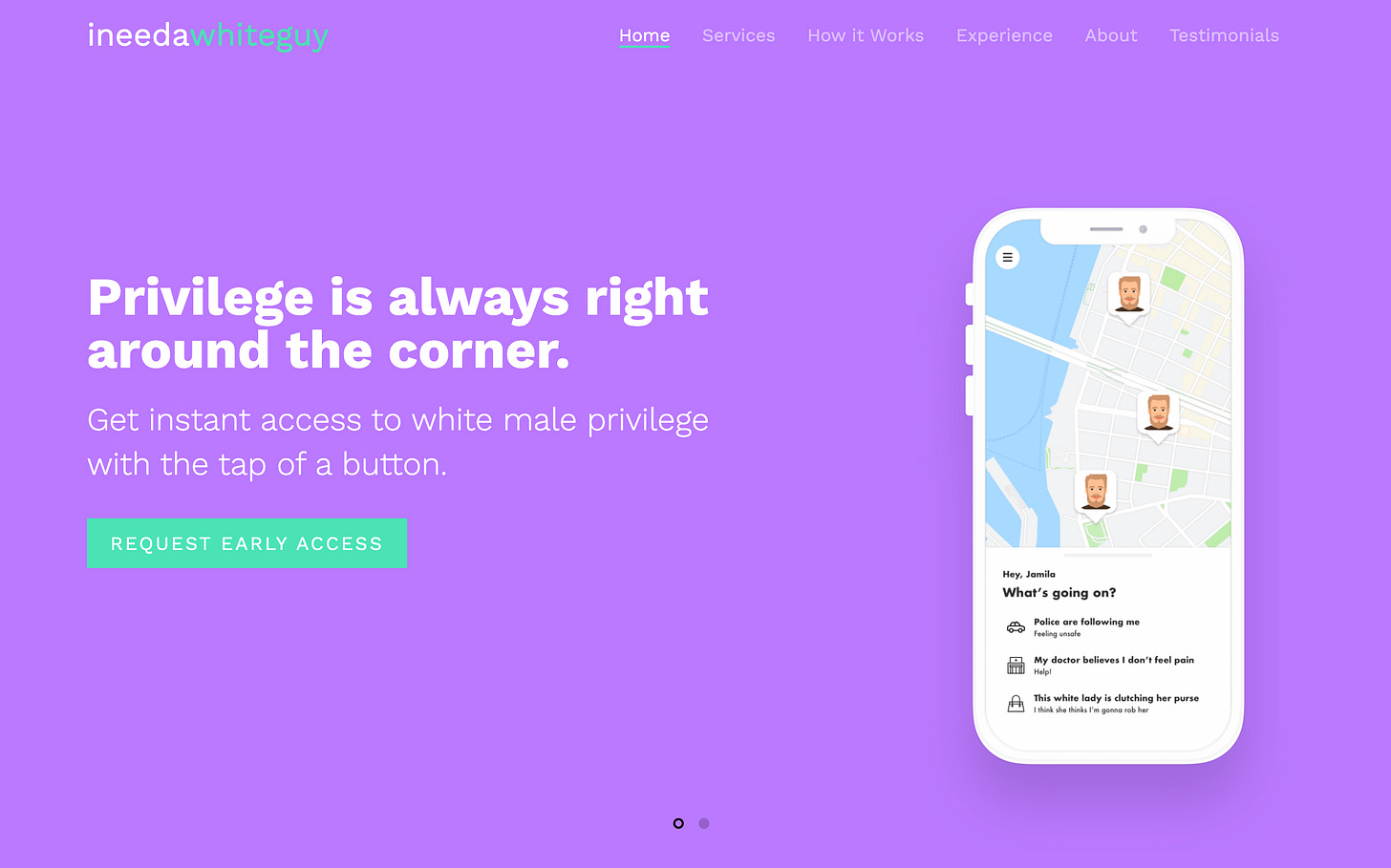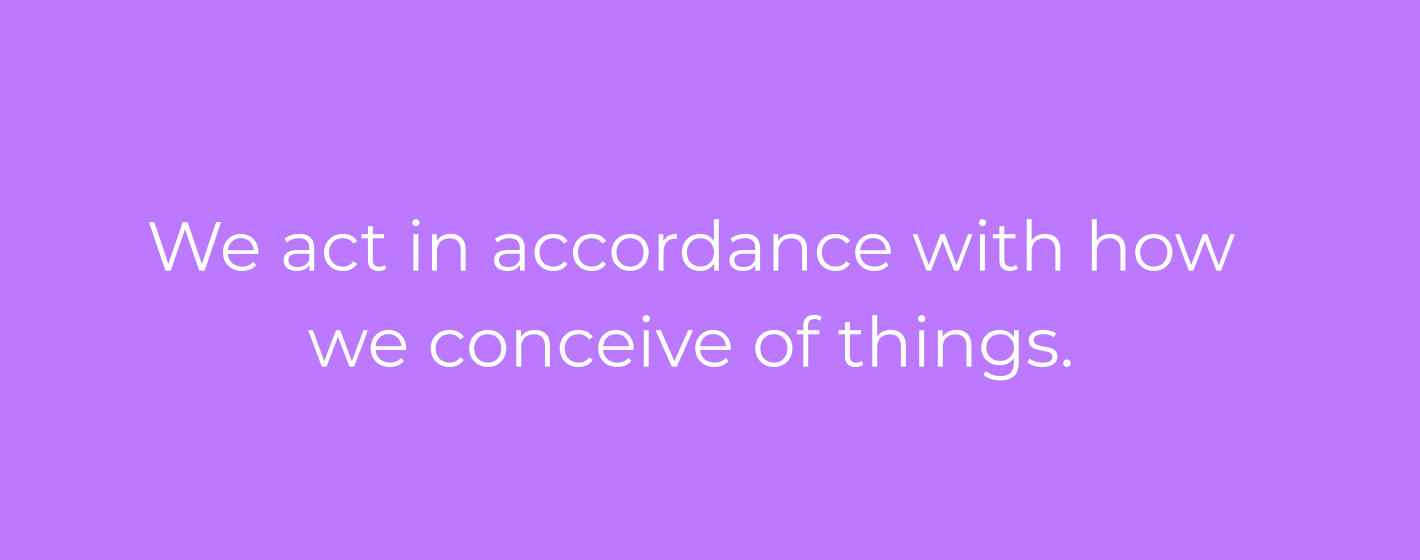This is a Project Profile issue of The Trick Revealed - the newsletter from Jabari Bell, which you can read more about here. If you enjoy it and would like more in your inbox, consider subscribing.
Back in August 2019, I was sitting on my Brooklyn couch with my wife watching John Oliver’s special on Racial and Gender Bias in Medicine. He set the stage with some grim facts regarding racial and gender bias in the medical field:
Women are twice as likely to die as men in a year following a heart attack, yet only 40% of women’s health care routines include a heart risk check.
Women are twice as likely to suffer from chronic pain than men but studies show that they are twice as likely to be be dismissed from the hospital as men as well.
A NYT article last year showed that black infants in America are now more than twice as likely to die as white infants in childbirth. This gap is wider than it was in 1850.
What if I could request white male privilege like an Uber or a Lyft?
Those are some troubling statistics, all of which I was ignorant to before watching the episode. Oliver was able to toe the line between the horrific and hilarious masterfully, allowing the audience to take in the gravity of the situation without being crushed by it. I was educated, tickled, and horrified at the same time.
The episode has a section at the end where Wanda Sykes and Larry David do a skit that centers around a spoof website that features canned responses to common questions at the doctor that a person of color or woman can use so they'll be taken seriously.
I thought it was a funny idea, and thought it’d be fun to see what I could do with a similar concept.
I wondered to myself, "What if someone could request white male privilege like an Uber or a Lyft? What if they could rent it to help them get to where they are trying to go?"
Enter I need a white guy
I took a few hours the following day and built this landing page. I did the writing, designed the app screenshots in Sketch and grabbed a landing page template to bring it all together.
Sykes’ and David’s doctor helping app was on brand with the topic of the show, but I thought to myself that white male privilege could be useful in a wide array of situations beyond the doctor. The idea of being able to request privilege from an anonymous white guy felt too interesting not to explore.
The concept centers around racial classification and the alienating quality of being treated as a member of a classification as opposed to an individual human being.
A generic avatar is used because any white guy will do. This erasure paired with the promise of privilege is part of what makes I need a white guy paradoxical and cruel: it erases white guys in the way that we who are not white guys have been erased.
Equality, instantly gratified
The services highlight what happens when you pair social change with the illusion of instant gratification. We are a society that expects everything now, and is part and parcel of a population of constant customers. We unknowingly project this expectation of instant gratification onto everything.
Companies are there to fill the gap between unrealistic expectation and unrealistic reality, for a price. The price is that we begin to treat ourselves internally as consumers. There is no life ailment that is not a purchase away. And who must I become to believe that a human right is something that can be bought?
Who must I be to believe that a value can be assigned to my “me-ness”? The engine of consumerism is fueled by the mythology of self-worth and self-value. One is worth what one believes one is worth, but the very belief that one has worth in the first place is like measuring time in meters instead of seconds. Self-worth as a belief is as precise as it is inaccurate, like the statement: “The day lasted exactly 24 meters. I am worth exactly 47 likes.”
People who believe that their worth is something that can be improved upon make for excellent customers. And I cannot help but to make myself into an excellent customer, the best of all customers.
The Trick Revealed is a newsletter where I’ll be sharing my illustrations, writing, and imaginary brand creations three to four times a month. If you’re into that sort of thing stick around! <3
Going back to Cali, with Alex Qin
New Yorkers walk a lot and sometimes we take the expectation of having foot access to necessities wherever we travel. We city folk can also carry the expectation of the New York City block as the gold standard distance between 2 intersections on a map. “That looks like about an avenue’s distance, maybe a little more”, I said to my wife Zainab. I was really, really wrong.
We were in Silicon Valley for the 10 minute YC interview and I stubbornly wanted to walk as much as possible. It was the end of the summer 2019 and Zainab was on the phone with Alex Qin as we journeyed on foot to a café.
Alex asked me if I wanted to come to San Francisco to give a talk at QCon 2019. I immediately complained about not wanting to make the trip back to California so soon, so I told her that I’d do it if I could talk about I need a white guy, thinking that she’d say “no” and that my joints would be spared the trip.
“Sure that sounds great, see you there! Send me an abstract for the talk and a bio over tomorrow!”
I had no idea what I was going to talk about.
Metaphors we Create by
This is the talk abstract that I came up with:
Metaphors We Create By
Come listen to the creator of controversial ineedawhiteguy.com discuss metaphor and its influence on social consciousness. Learn how well intentioned social efforts can perpetuate the very structures they claim to dismantle when the dismantlers are ignorant to the metaphorical topology of their ideologies. We’ll use this insight as a lens to explore ways to create in more socially conscious ways.
Never before has this been explained in terms of that with such self and social consciousness. Jabari is going to give you the pitch of a lifetime and then get messy with metaphors containing ideas stolen from the likes of Jacques Lacan, Slavoj Žižek, and Ja Rule.
You’ll laugh, cry, and want to get the hell out of there.
I couldn’t help but feel that I’d oversold myself, except for the wanting to get the hell out of there part. I still had no idea what I was going to say and the site hadn’t created any controversy, yet. I was reading a lot about language and metaphors at the time so I figured that might be a good place to start.
A ~200 word TLDR of the talk:
All humans exist within culture. It can be hard to be aware that we exist in a culture because culture is expressed through cultural norms. Normal and reality can be synonymous and we can mistake the two. This extends to behavioral norms. We are often blind to how cultural norms are formed and how they shape our behavior. Cultural norms are based conceptually on metaphors, and those different metaphors give rise to different sets of behavioral norms to chose from.
For instance, if you come from a culture where argument is treated as war, then the idea of people attacking and defending their points makes perfect sense. But if you brought a person from a culture where argument is treated as dance instead of war, then it is doubtful they would recognize that the war like arguers were arguing at all. Argument as dance would perhaps generate a more collaborative type of argumentation.
I need a white guy preaches humanity using the conceptual metaphor of “privilege (human right) as commodity”. Commodifying people in the name of good still has a dehumanizing effect on those people being commodified. Being aware of these conceptual metaphors and how they influence behavior can make creators more aware and create with greater efficacy.
In Conclusion
I learned a lot from creating I need a white guy. It gave me an opportunity for personal reflection on how my own beliefs can set my efforts up for failure or success. And also a greater awareness into how I can tell if and when I might be lying to myself about something.
If you’re wanting to explore some of these ideas more, definitely check out the John Oliver episode, my talk at QCon, Metaphors We Live By by George Lakoff which introduced me to a lot about how belief is structured, and commodity fetishism. If you’re really wanting to dig deep, check out Plastic Pills’ episode on Anti-Oedipus in regards to capital’s deconstruction of desire, and any of his videos on Lacan if you want an introduction to Lacanian thought.
This issue is a part of the Project Profiles series, which are stories of projects that I've done myself, been a part of, or heard of.
Consider subscribing or sharing if you're looking for creative inspiration in your inbox!









Nah